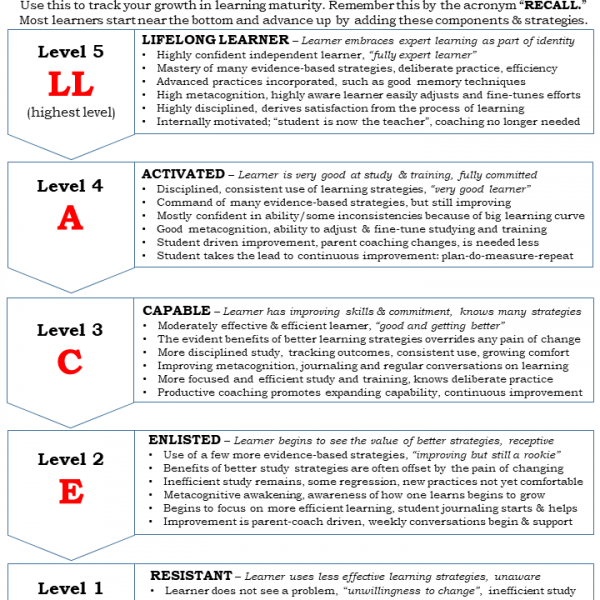Learning hard things requires a disciplined approach that will keep you in “focused mode.”
We’ve identified seven helpful components–use this as a worksheet to assess what you are doing or not doing now, and then identifying what you need to change to be more successful.
Checklist
- Growth MindsetAdapt what Dr. Carol Dweck has called a “Growth Mindset” to tackle hard things. This starts with the ongoing belief in your ability to grow yourself through your efforts and practice. Remember that learning to master one hard thing also improves your capability to master other hard things.
- Identify and use defined learning strategiesBefore your start, you will need to identify and list the learning strategies that you will deploy to learn this hard thing. Discuss this with your coach and set a plan. Different disciplines and problems require different tools. Learn how to use many learning aids and know when to deploy which ones. Avoid informal or unplanned approaches because they will always underperform for you.
- Stay on Track – Create a SystemYou will need a system to monitor your work over the short and long term. Find one approach that works for you and use it. Complete a daily study journal then use it to fine tune your system.It’s not really a system if you don’t track it.
- Focus on the Process not the GoalMost hard things take a longer time to master. For example, for a native English speaker, learning Mandarin Chinese will take about 1400 hours to get to a proficiency level C1. As that learner, it can get pretty frustrating when every day you are looking at a goal so far away. Two hours a day, five days a week – it will take two and a half years to get there!But, if that is what you desire to accomplish, keep your head down and focus on the execution of your study process each day and each week, you will be focusing on what you can control now, allowing you to feel better that you are doing the right things which make for good progress.
- Ask Your Coach for HelpKeep in mind that in every sport, at almost every level, the best players have coaches. Don’t overlook the value of getting help from your parent coach. Reach out to your coach often–don’t wait for your coach to come to you. Using a coach is a sign of commitment, not one of weakness.
- Visualize Your ProgressA sense of progress provides motivation, especially at the times when progress seems slow. Adapt a log that creates a visual display of what you have been learning. For example, if you are learning a new language at the rate of 10 new words a day, log this on a worksheet or journal. It may seem slow, but that’s 50 words a week given a 5-day workweek, and therefore 200 per month!
- Recognize there will be StumblesDon’t fall into the “suckers trap” by believing that you can make flawless progress through willpower alone. With hard things, there are always going to be things that don’t cooperate. You should begin with the mindset that you know you will face setbacks and things not going to plan. There will be, for example, forgetting things you thought you knew. When you hit the inevitable unanticipated speed bump, it easy to get thrown off track and use this as an excuse to quit. When you stumble, give yourself a way out. Acknowledge the situation, accept setbacks as normal occurrences, don’t engage in destructive self-criticism, and just move on.
Your Self-Assessment
Answer these questions:
- Which of these do I do now, and how well? For which subjects? How could I do this better?
- Which of these do I not do that I should start doing? For which subjects? How could this help me?








